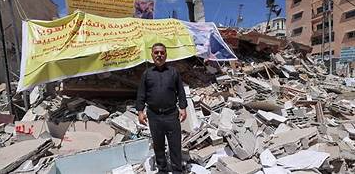The Palestinian economist on how Gaza can be rebuilt
The devastation in Palestine since October 7, 2023, has left most Palestinians in shock, struggling to comprehend the scale of the destruction, loss of life, and the worsening socio-economic crises. Despite reports from international organizations and NGOs, the full extent of the damage continues to unfold. The most recent report by the World Bank estimates that the cost of the destruction to housing and physical infrastructure in Gaza stands at $18.5 billion, but this figure only accounts for the early months of the war. As the conflict spread to southern Gaza, particularly towards Khan Yunis and Rafah, this figure has already doubled, and it continues to climb.
The United Nations has warned that Gaza’s recovery could take decades, predicting a 40-year setback to Palestinian human development. The removal of the 40 million tonnes of rubble left by the Israeli airstrikes is expected to take at least 15 years. Gaza has lost its annual GDP of around $3 billion, and 90% of its population now lives in poverty. According to UN estimates, emergency humanitarian aid for Gaza alone has been costed at over $3 billion for 2024. These figures paint a stark picture of the damage wrought by the war and the ongoing humanitarian crisis.
Raja Khalidi, a Palestinian economist, argues that the scale of Gaza’s destruction requires a comprehensive and long-term reconstruction effort. Khalidi suggests that, similar to the post-World War II recovery of Europe through the Marshall Plan, the international community will need to step up with a new “Marshall Plan” for Palestine to rebuild Gaza and address the broader economic and social challenges facing the region.
Khalidi highlights the immense human toll, particularly the loss of life, as the conflict has further entrenched poverty and deprivation in Gaza. He also points to the damage to key infrastructure, including hospitals, schools, and public services, which have left the population unable to access basic needs. Khalidi stresses the urgent need for a political solution, alongside the economic and physical rebuilding, to address the root causes of the conflict and ensure that Gaza does not face a future of perpetual crisis.
Ultimately, Khalidi’s call for a new Marshall Plan for Palestine reflects the enormity of the task ahead, emphasizing the need for a coordinated international effort to rebuild Gaza, provide humanitarian relief, and support long-term development. Without such a plan, he warns, Gaza’s recovery will remain out of reach, and the ongoing suffering will only deepen.

